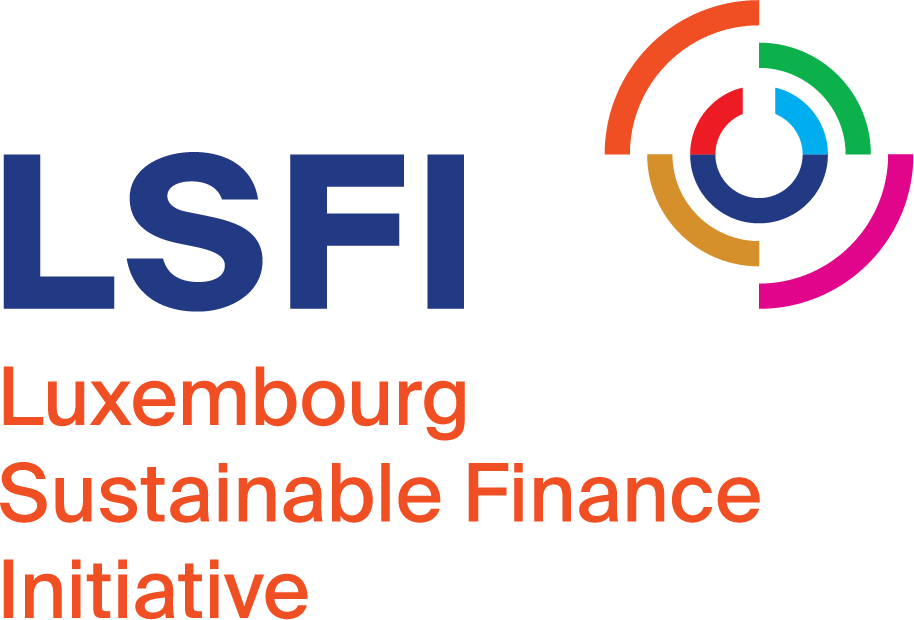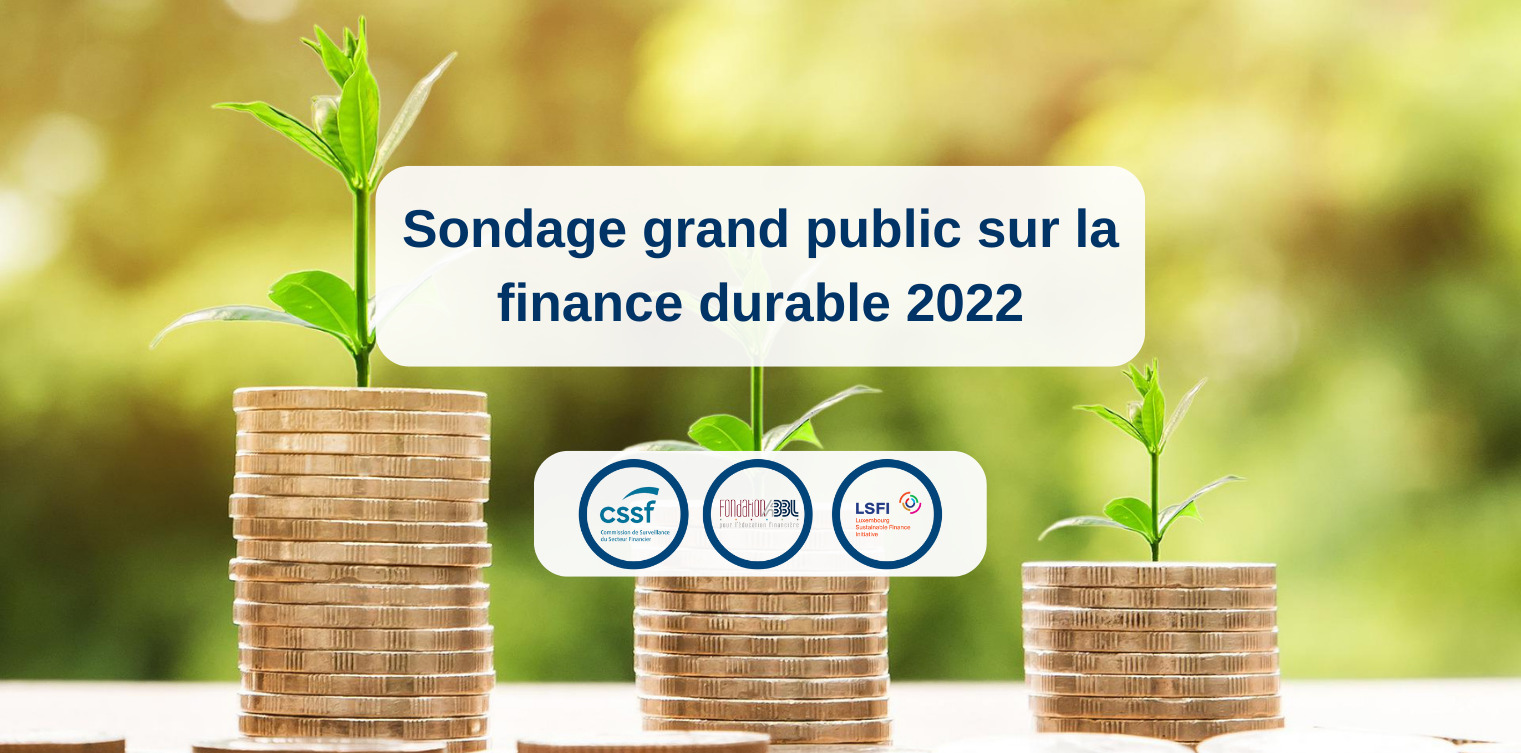General public survey on sustainable finance: interest in the subject but need for better information.
Given the challenges surrounding the development of sustainable finance, the Commission de Surveillance du Secteur Financier (CSSF), the Fondation ABBL pour l’éducation financière (ABBL Foundation) and the Luxembourg Sustainable Finance Initiative (LSFI) mandated ILRES to conduct a survey in order to better assess the perception and knowledge of Luxembourg households in this area. The main conclusions are: a favourable opinion with respect to the possible impact of the financial world but a lack of knowledge about this subject and hence the importance of educational action and the key role of the banker.
Sustainable finance at a pivotal moment
Sustainable finance refers to financial decisions that not only aim financial performance but also take into account the impact of investments on the environment, the social aspects and the sound business management (also known as governance aspects).
Under the “European Green Deal”, the EU established a regulatory framework in order to develop and enhance the integration of environmental, social and governance (ESG) factors in the functioning of the financial markets and in the financing of the economy. The aim is to adopt measures to create a financial system capable of promoting and fostering a sustainable development in the economic, social and environmental areas, by contributing to the implementation of the Paris Agreement and of the 2030 Agenda for Sustainable Development of the United Nations. This transition towards a sustainable economy will require massive investments which cannot be supported solely by public funds; its financing by professional and private investors will be essential. The general public will therefore also have a role to play.
In this context, the CSSF, the ABBL Foundation and the LSFI wanted to know the level of knowledge and understanding of the general public, as well as their interest in sustainable finance in order to better assist them in this development. “To invest in a sustainable finance product, the people interested must have confidence in this sector. This confidence cannot be decreed, but it is built by acquiring a good understanding and knowledge of the product in which we want to invest,” Danièle Berna-Ost, General Secretary of the CSSF, explains.
The survey was conducted by ILRES from mid-April to mid-May 2022 using a representative sample of 1,011 people living in Luxembourg. One half of the interviews were carried out by phone and the other half online.
Favourable opinion about the possible impact of the financial sector
First, the survey shone a spotlight on the fact that the majority of the interviewed people deemed that the financial sector can have a positive impact on the development of renewable energy, local communities or the environment and climate. Similarly, 74% of the interviewees said that the financial sector can play an important role in the transition of our economy towards more sustainability and 71% of them said that each individual can contribute towards a more sustainable world through his/her own financial decisions.
Sustainable finance? A subject not yet well known…
In general, sustainable finance is a subject that the general public has trouble understanding: 47% of the interviewees admitted not to know or to face difficulties in knowing what it means.
About 43% of them associated sustainable finance with green finance, which indicates partial understanding. The other dimensions of ESG investments, namely the social and governance impact of businesses are however less known. Similarly, when we get down to the details of the sustainable finance products or the terminology, most of the interviewees admitted their lack of knowledge about the subjects discussed or gave an inaccurate definition.
Rather classic trigger factors
We note that the factors triggering an investment are classic and relate to the risk/return factor. The participants said that profit (first) and the risk level (second) were defining factors when they decide to invest. The opinions are divided regarding the profit of sustainable investments compared to that of traditional investments. A slight majority considers that the latter are more profitable, which indicates the need for better information and awareness-raising on the subject.
A significant development potential
27% of the interviewees have already proactively enquired about an investment in a sustainable product. 21% claimed to have already made an investment and 53% could imagine themselves making one. However, it is worth mentioning that about 10% of the interviewees could envisage investing over half of their savings in sustainable finance products. Moreover, the higher the amount of available assets is, the more the interest in sustainable finance increases.
“It is clear that sustainable products spark increasing interest, but there is still a lack of information as to their impact and false ideas associated with them, such as greenwashing, the returns on investment or an overall lack of knowledge about the ESG issues and their different applications, all of which need to be urgently addressed,” Nicoletta Centofanti, interim General Manager of the LSFI, said.
The central role of the banker
In general, the people interviewed overall trust their banker or financial professionals. The banker is considered both a source of reference information and of trust (61%). However, it must also be noted that only 24% of the interviewees have already received a proposal for an investment in sustainable products.
“The fact that the survey highlights the central role of the banker is good news for the ABBL as well as for its members; but it is also a challenge,” Catherine Bourin, member of the Board of Directors of the ABBL Foundation, said. “The expectations vis-à-vis bank advisors are significant and they bear major responsibility with regard to the development of sustainable finance.”
Timely progress in the financial regulation
“The regulatory framework which is currently being implemented is very ambitious and complex with tight deadlines. However, it reflects the climate emergency imperatives,” Danièle Berna-Ost points out. In this context and bearing in mind the banker’s central role which emerged from the survey, the entry into force, on 2 August 2022, of new requirements under MiFID has been the first compulsory contact of the bankers and their clients with respect to sustainable finance. Bank advisors have now the obligation to discuss with each of their clients their expectations concerning the environmental, social and governance impact of their investments. This new obligation should accelerate the development of sustainable finance by confronting possible investors with the subject.
Pressing need to continue the educational efforts undertaken
“It is clear that as market participants, for us as well as our members a significant educational effort is still needed,” Catherine Bourin notes, “even if it is only by using a less technical vocabulary as requested by 74% of the interviewees and by showing also the extent and potential of the field of sustainable finance.” “87% of the participants in the survey think that the general public should be more informed in order to better understand and grasp the subject of sustainability in the financial world. This shows us how long the road ahead still is,” Nicoletta Centofanti continues.
Each of the three partners will therefore continue their efforts in terms of education. “At the CSSF, we will carry on assisting the industry in the implementation of a regulatory framework adapted to the deployment of sustainable finance. With respect to investor protection, we will enhance the efforts to educate investors about sustainable investments notably by providing clear and accessible information on the meaning of sustainable finance. There is no consumer protection without financial education,” Danièle Berna-Ost underlines.
The ABBL Foundation makes information and awareness-raising tools such as educational videos available to the general public and offers training modules in high schools to explain sustainable finance. Furthermore, it will launch, in 2023, a new digital game focussed on financial education for all.
Throughout the next months, the LSFI will be concentrating on and intensifying its activities aiming at investors and private savers. A dedicated section on the website of the LSFI will be launched to provide information, tools and practical advice to invest sustainably. The LSFI will also continue to offer courses to raise awareness and inform the general public so that sustainable finance reaches as many households as possible in order to give everyone the possibility to contribute to the challenges our society faces.
For more information:





